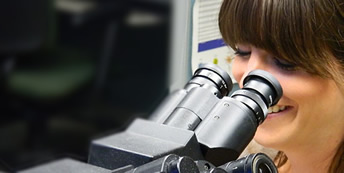About the Program
 Case Mix
Case Mix
At the University of Rochester Medical Center, excellent clinical material is available with a great diversity in case mix. Our Hematopathology Unit sees over 4,000 cases per year, including more than 300 lymph nodes, 2,300 blood/bone marrows, and upwards of 500 consults from outside institutions. All areas are covered by full time faculty and licensed laboratory specialists. The Wilmot Cancer Center performs the most bone marrow and stem cell transplants in Upstate New York and has the largest team of specialists dedicated to treating lymphomas.
Curriculum
We offer a comprehensive but flexible curriculum. While nine months of the year must be devoted to diagnostics of lymphoma and leukemia (during which all modalities, including flow cytometry, molecular studies, cytogenetics are incorporated into cases), up to three months of the year can be flexibly scheduled. Fellows may elect to use this time for scholarly activities, in depth experience in sub-specialty labs, or tuning additional skills that may be pertinent to a specific job. In addition to directing rotating residents and students on the service who also take cases, fellows can expect to have primary responsibility for at least 600 marrows and 300 lymph nodes in the year.
Support
To get the fellows quickly comfortable with advanced techniques, fellows are engaged daily in flow cytometric analysis and are expected to re-gate their cases whenever needed; each fellow has direct access to flow cytometry software in the office. The fellows run a weekly “flow cytometry gating” and “molecular/heme correlation” conference where difficult and informative cases are discussed with the entire team. We make an effort to include the fellows in management discussions so that they can become familiar with the types of workflow issues and problem solving that will likely be expected of them in a few short months.
To ensure that the fellows achieve all that they can during this year, we have a created monthly “mileposts”. These are used for the fellow to self-evaluate and then to discuss with the program director. This system allows each fellow to set her/his own pace and to concentrate on particular areas of interest but at the same time maintain a sense that they are on the appropriate educational trajectory for the year.
 What brought you to the Hematopathology Fellowship program at the UR Medical Center?
What brought you to the Hematopathology Fellowship program at the UR Medical Center?
"The faculty is great, the service is busy, and Rochester is a nice city to live in."
Kelly Garner, MD